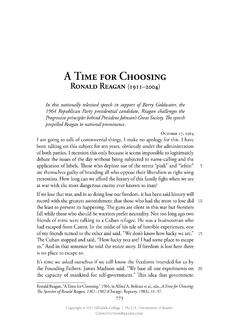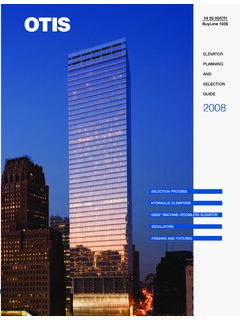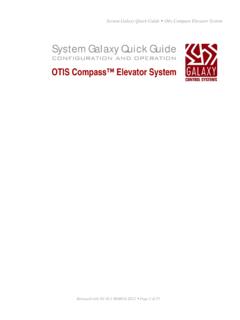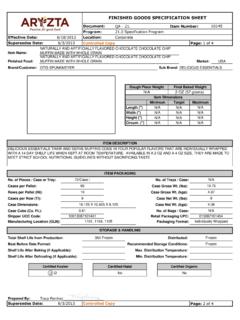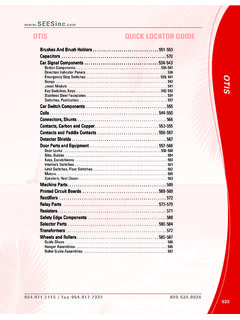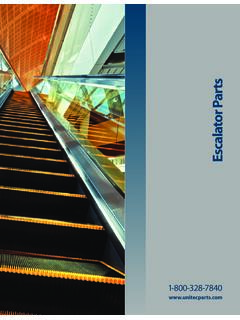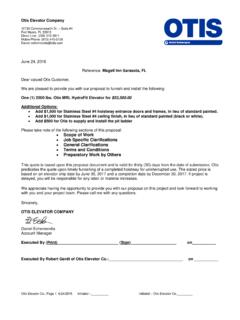Transcription of Rights of the British Colonies Asserted and Proved
1 73 Rights OF THE British COLONIESOtis rose to prominence in 1761, after he gave a courtroom speech oppos-ing the Writs of Assistance blanket warrants issued by the British for searching suspect property. He edited that speech into this essay three years later, after the passage of the Sugar Act. Its arguments contain the seed of the American Revolution an appeal to natural Rights applied against particular abuses of political power. Struck by lightning in 1783, otis did not live beyond the Revolution. But John Adams remarked that he had never known a man whose service for any ten years of his life were so important and essential to the cause of his country as those of Mr. otis from 1760 to 1770. 1764 Let no Man think I am about to commence advocate for despotism, because I affirm that government is founded on the necessity of our natures; and that an original supreme Sovereign, absolute, and uncontrollable, earthly power must exist in and preside over every society; from whose final decisions there can be no appeal but directly to Heaven.
2 It is therefore originally and ultimately in the people. I say this supreme absolute power is originally and ultimately in the people; and they never did in fact freely, nor can they rightfully make an absolute, unlimited renunciation of this divine right. It is ever in the nature of the thing given in trust, and on a condition, the performance of which no mortal can dispence with; namely, that the person or persons on whom the sovereignty is conferred by the people, shall incessantly consult their good. Tyranny of all kinds is to be abhorred, whether it be in the hands of one, or of the few, or of the many. And though in the last age a generation of men sprung up that would flatter Princes with an opinion that they have a divine right to absolute power; Yet slavery is so vile and miserable an estate of man, and so directly opposite to Rights of the British Colonies Asserted and ProvedJames otis (1725 1783)7351015_____James otis , The Rights of the British Colonies Asserted and Proved , 1764, in Jack P.
3 Greene, ed., Colonies to Nation 1763 1789: A Documentary History of the American Revolution (New York: W. W. Norton & Company, 1975), 28 33. Reprinted from James otis , The Rights of the British Colonies , Rights AND THE AMERICAN REVOLUTIONthe generous temper and courage of our nation, that it is hard to be conceived that an Englishman, much less a gentleman, should plead for it ..But let the origin of government be placed where it may, the end of it is manifestly the good of the whole. Salus populi suprema lex esto, is of the law of nature, and part of that grand charter given the human race (though too many of them are afraid to assert it) by the only monarch in the universe, who has a clear and indisputable right to absolute power; because he is the only one who is omniscient as well as British constitution in theory and in the present administration of it, in general comes nearest the idea of perfection, of any that has been reduced to practice; and if the principles of it are adhered to, it will, according to the infal-lible prediction of Harrington, always keep the Britons uppermost in Europe, till their only rival nation shall either embrace that perfect model of a commonwealth given us by that author, or come as near it as Great-Britain is.
4 Then indeed, and not till then, will that rival and our nation either be eternal confederates, or contend in greater earnest than they have ever yet done, till one of them shall sink under the power of the other, and rise no more..Every British Subject born on the continent of America, or in any other of the British dominions, is by the law of God and nature, by the common law, and by act of parliament, (exclusive of all charters from the crown) entitled to all the natural, essential, inherent and inseparable Rights of our fellow subjects in Great-Britain. Among those Rights are the following, which it is humbly con-ceived no man or body of men, not excepting the parliament, justly, equitably and consistently with their own Rights and the constitution, can take That the supreme and subordinate powers of legislation should be free and sacred in the hands where the community have once rightfully placed The supreme national legislative cannot be altered justly till the common-wealth is dissolved, nor a subordinate legislative taken away without forfeiture or other good cause.
5 Nor then can the subjects in the subordinate government be reduced to a state of slavery, and subject to the despotic rule of others. A state has no right to make slaves of the conquered. Even when the subordinate right of legislature is forfeited, and so declared, this cannot effect the natural persons either of those who were invested with it, or the inhabitants, so far as to deprive them of the Rights of subjects and of men. The colonists will have an equi-table right, notwithstanding any such forfeiture of charter, to be represented in parliament, or to have some new subordinate legislature among themselves. It would be best if they had both. Deprived, however, of their common Rights as subjects, they cannot lawfully be, while they remain such..5101520253035 75 Rights OF THE British COLONIES3rdly. No legislative, supreme or subordinate, has a right to make itself arbitrary.
6 It would be a most manifest contradiction, for a free legislative, like that of Great-Britain, to make itself The supreme legislative cannot justly assume a power of ruling by extempore arbitrary decrees, but is bound to dispense justice by known settled rules, and by duly authorized independent The supreme power cannot take from any man any part of his property, without his consent in person or by The legislative cannot transfer the power of making laws to any other are their bounds, which by God and nature are fixed, hitherto have they a right to come, and no To govern by stated Those laws should have no other end ultimately, but the good of the Taxes are not to be laid on the people, but by their consent in person, or by Their whole power is not are the first principles of law and justice, and the great barriers of a free state, and of the British constitution in particular.
7 I ask, I want no more Now let it be shown how it is reconcileable with these principles, or to many other fundamental maxims of the British constitution, as well as the natural and civil Rights , which by the laws of their country, all British subjects are entitled to, as their best inheritance and birth-right, that all the northern Colonies , who are without one representative in the house of commons, should be taxed by the British the colonists, black and white, born here, are free born British subjects, and entitled to all the essential civil Rights of such, is a truth not only manifest from the provincial charters, from the principles of the common law, and acts of parliament; but from the British constitution which was re-established at the revolution, with a professed design to secure the liberties of all the subjects to all generations.
8 [T]he liberties of the subject are spoken of as their best birth- Rights No one ever dreamed, surely, that these liberties were confined to the realm. At that rate, no British subjects in the dominions could, without a manifest contradiction, be declared entitled to all the privileges of subjects born within the realm, to all 510152025303576 NATURAL Rights AND THE AMERICAN REVOLUTION intents and purposes, which are rightly given foreigners, by parliament, after residing seven years. These expressions of parliament, as well as of the charters, must be vain and empty sounds, unless we are allowed the essential Rights of our fellow-subjects in can there be any liberty, where property is taken away without consent? Can it with any color of truth, justice or equity, be affirmed, that the northern Colonies are represented in parliament?
9 Has this whole continent, of near three thousand miles in length, and in which, and his other American dominions, his Majesty has, or very soon will have, some millions of as good, loyal and useful subjects, white and black, as any in the three kingdoms, the election of one member of the house of commons?Is there the least difference, as to the consent of the Colonists, whether taxes and impositions are laid on their trade, and other property, by the crown alone, or by the parliament? As it is agreed on all hands, the crown alone cannot impose them, we should be justifiable in refusing to pay them, but must and ought to yield obedience to an act of parliament, though erroneous, till can see no reason to doubt, but that the imposition of taxes, whether on trade, or on land, or houses, or ships, on real or personal, fixed or floating property, in the Colonies , is absolutely irreconcilable with the Rights of the Colonists, as British subjects, and as men.
10 I say men, for in a state of nature, no man can take my property from me, without my consent: If he does, he deprives me of my liberty, and makes me a slave. If such a proceeding is a breach of the law of nature, no law of society can make it just. The very act of taxing, exercised over those who are not represented, appears to me to be depriving them of one of their most essential Rights , as freemen; and if continued, seems to be in effect an entire disfranchisement of every civil right. For what one civil right is worth a rush, after a man s property is subject to be taken from him at pleasure, without his consent? If a man is not his own assessor in person, or by deputy, his liberty is gone, or lays entirely at the mercy of think I have heard it said, that when the Dutch are asked why they enslave their Colonies , their answer is, that the liberty of Dutchmen is confined to Holland; and that it was never intended for Provincials in America, or any where else.
